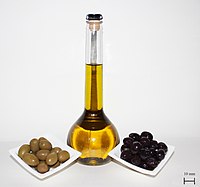
Photo from wikipedia
Abstract Salt-extracted canola protein isolate (CPI) from a cold-pressed meal was used (1–4 wt%) to develop concentrated 50% canola oil-in-water emulsions (pH 7) using a high-pressure homogenizer and the effect of… Click to show full abstract
Abstract Salt-extracted canola protein isolate (CPI) from a cold-pressed meal was used (1–4 wt%) to develop concentrated 50% canola oil-in-water emulsions (pH 7) using a high-pressure homogenizer and the effect of various environmental factors on emulsion stability and rheology was investigated. As CPI concentration increased, droplet size decreased from 16.4 to 3.8 μm while the droplet charge remained constant at around −11 mV. All emulsions flocculated over 30 days but exhibited exceptional resistance to coalescence. Storage moduli of all emulsions were higher than the loss moduli at all CPI concentrations, suggesting a gel-like structure. Emulsion stability was also investigated by adding vinegar (10 wt%, pH 3.7) or salt (1 wt%) or a mixture of both and heating at 80 °C. The addition of either salt or vinegar reduced the viscosity and gel strength of emulsions, compared with the non-treated emulsions. No significant change in microstructure was observed with the addition of either vinegar or salt, but in the presence of both, the droplets were extensively aggregated, leading to a non-flowing strong gel structure with significantly higher viscosity and gel strength. Salt addition led to charge screening, but the droplets remained less flocculated due to steric repulsion, while with acid, higher charge prevented aggregation. When both salt and acid were present, lower charge and change in protein conformation led to extensive droplet aggregation. Heat treatment led to an approximately ten-times increase in gel strength, which could be attributed to CPI thermal denaturation leading to droplet and protein aggregation. These findings may extend the application of CPI in viscoelastic foods such as salad dressing.
Journal Title: Food Hydrocolloids
Year Published: 2020
Link to full text (if available)
Share on Social Media: Sign Up to like & get
recommendations!